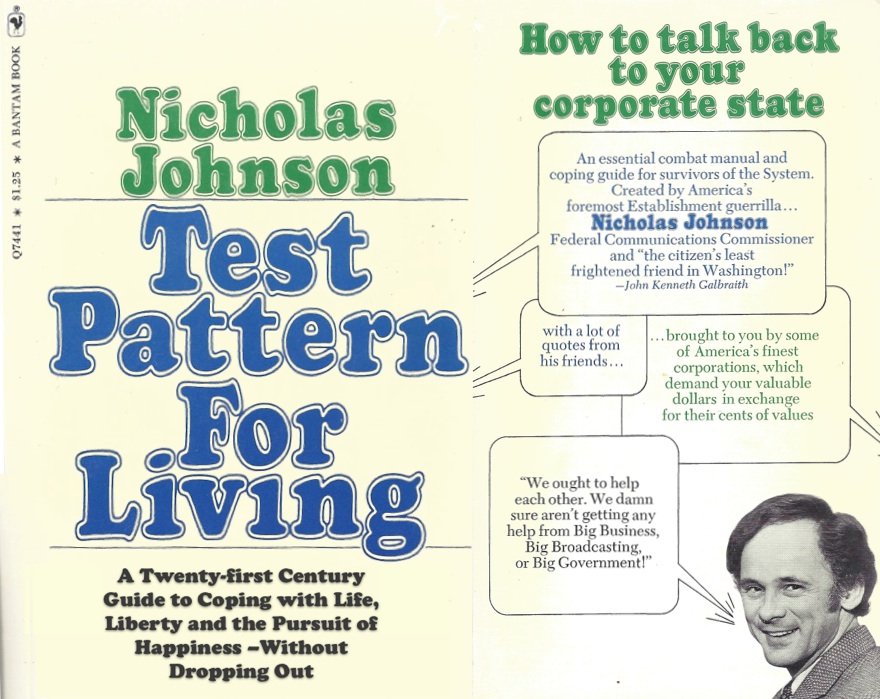Return
to Test Pattern for Living Contents Page
Copyright Notice: Copyright © 1972 by Bantam
Books, Inc.; Copyright © 1996 by Nicholas Johnson. All rights
reserved. This book may not be reproduced in whole or in part in
any medium known now or in the future. Provided, however, that permission
is hereby granted to distribute this book under the following conditions:
(1) that it is distributed in its entirety, including this copyright notice
and 1996 Preface, (2) that no charge is exacted, or revenue received, directly
or indirectly, by anyone in connection with the transfer, and (3) as a
matter of courtesy and information, that the author be informed, simultaneously
with the distribution, of any distribution to more than one person or posting
for availability on the Internet, Web, or publicly available directory.
Any other use requires the prior permission of the author: Nicholas
Johnson, njohnson@inav.net, postal:
Box 1876, Iowa City IA 52244-1876, U.S.A.
Conclusion [Chapter 10]
My generation constitutes the straggling last remains of the puritan ethic, inner-directed old Americans. I can recall as a child the arrival of "civilization" at my uncle's Iowa farm: electricity for the lights and water pump instead of kerosene lanterns and the windmill; a fancy stove to replace the old cast-iron potbelly we fed corncobs and coal; indoor plumbing and a hot-water heater to replace the outhouse and the heating of bath water on the stove. Those were days of family ties, hard work, some hard times, Franklin Roosevelt, "The War," the Fourth of July, and genuine American patriotism taught you by grateful immigrant grandparents. I was young, but I was alive and aware, and I have some feeling for the confusion, frustration, and fears that many of my older family and friends express today.
No age is easy; but being in one's thirties at this time is especially difficult. You are caught between cultures. The temptation is to take sides, to move either forward or backward in time. The challenge is to stand firm, to try to discover as precisely as you can your honest-as-possible-self, to pick the best from all possible worlds, and to try to encourage constructive communication between two generations that seem to be missing most of what the other is saying. That is what many my age realize to be their responsibility and their opportunity; it is what I am trying to do.
What all of us need to learn, more effectively than any of us have so far, is what we have in common as a people. Four examples: When children reject the standards and life styles of their parents, what they are sometimes substituting instead turns out to be pretty close to the value system of their grandparents. Whether or not "God is dead" -- in the sense that organized, institutionalized religion is failing to respond to the needs of people in this age -- it is clear that religion is not dead (in the sense of a personal quest for
a meaning in life beyond the daily routine). Those who are turning away from corporate jobs are often opting for harder and more meaningful work, not lethargy. Young people are not the only Americans who enjoy music, physical activity, poetry, and the great outdoors.
Nobody has "the" answer. Certainly I don't. Moreover, the answer changes -- for each of us, over time, in different places. America's answer will only be found when two-hundred million individuals find two-hundred million individual answers.
Perhaps it is safe to suggest, however, that the best answers involve a sense of unity, of wholeness, of centering, of interconnectedness -- "the whole thing." Buying, and putting in place, the pieces in corporate America's jigsaw puzzle of conspicuous consumption doesn't seem to have that quality of purpose or unity. There is an alternative, which many believe to be more "natural," that seems to work better for me. It centers on the life force that binds all of us to each other, and the universe from which we came and to which we return. It encourages individual growth and attainment of potential. It encourages simplicity in relation to things, and a richness in relation to people. It seeks to integrate creativity and contemplation, love, religion, exercise, food, clothing, shelter, transportation (life-support activities), relation to nature, and professional productivity into a balanced life in the city that comes as close as possible to the kind of integrated whole life man lived when first on earth.
But there is no formula. The purpose of self-discovery is not to stop copying Howard Johnson and to start copying Nick Johnson -- or anybody else. The point is to find your own soul and kick it, poke it with a stick, see if it's still alive, and then watch which way it moves. Do it your way. Because you must. And because it's best. But don't forget to write and tell me how it all worked out.
